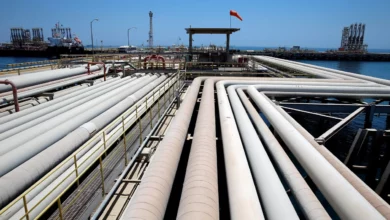Hong Kong–Oil prices surged and Asian stock markets plunged on Thursday, as traders worried about turmoil in Libya and possible further contagion within the Arab world.
Uprisings across North Africa and the Middle East have led to risk aversion among investors, causing them to buy up safe-haven assets such as gold and the Swiss franc, which hit a record high against the dollar.
With thousands fleeing Libya, opponents of leader Moamer Kadhafi seemed to be in control of swathes of the nation as he clung to his four-decade rule.
The 68-year-old despot vowed on Tuesday to purge opponents "house by house" and "inch by inch", drawing condemnation from US President Barack Obama.
With crude shipments from the country curtailed, oil prices jumped to highs not seen since 2008, potentially fuelling inflation at a time when many nations, particularly in Asia, are trying to keep it under control.
Brent North Sea crude — which is more sensitive to Middle East unrest because of Europe's greater dependence on oil from the region — reached US$119.79 in European trade late in the Asian day, before receding somewhat.
Foreign oil workers were fleeing Libya, leading analysts to raise the prospect of an oil crisis.
Fears of the unrest spreading in the region were pushing prices higher, said Victor Shum, senior principal of Purvin and Gertz energy consultants in Singapore.
"The concerns go beyond Libya, which is a relatively small oil producer, to the bigger oil producers that may be affected if the revolt spread," he told AFP.
Morocco, Bahrain, Yemen and Iran are already witnessing uprisings, after similar movements led to the ouster of the presidents of Egypt and Tunisia. In Saudi Arabia King Abdullah decreed an increase in social benefits to try to head off a similar fate.
Investors looking for safe havens pushed gold to US$1,414.00-US$1,415.00 an ounce by the end of Hong Kong trade, up from Wednesday's close of US$1,400.00-$1,401.00.
Stocks were mostly lower as dealers continued to cash out for a fourth day.
Tokyo fell 1.19 percent, or 126.39 points, to end at 10,452.71, while Sydney closed down 0.75 percent, or 36.60 points, at 4,809.30.
Mumbai fell 3.00 percent, or 545.92 points, to 17,632.41 after street demonstrations on Wednesday highlighted the problem of inflation.
Investors sold equities amid fears that India's central bank was preparing another interest rate hike, after data showed annual food inflation rose to 11.49 percent for the week ending February 12.
Hong Kong tumbled 1.34 percent, or 305.86 points, to 22,601.04, extending its losing streak to four straight sessions.
Stocks were also dragged down by an 0.88 percent fall on the Dow in New York.
However, Shanghai ended 0.56 percent, or 15.97 points, higher at 2,878.60, led by gains in coal miners and oil firms.
The euro rose to US$1.3781 in Tokyo trade from 1.3746 in New York late Wednesday. The common currency fell to 113.02 yen from 113.37 yen.
The dollar fell to 82.01 yen from 82.46 yen.
"Risk-averse investors are snapping up the Swiss franc and the yen" due to the Middle Eastern violence, said Akihiro Tanaka, a dealer at Resona Bank.
"Market participants have yet to figure out its impact on the global economy and concerns linger over how the turmoil would spread in the region."




